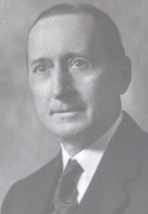Encyclopedia Dubuque
"Encyclopedia Dubuque is the online authority for all things Dubuque, written by the people who know the city best.”
Marshall Cohen—researcher and producer, CNN
Affiliated with the Local History Network of the State Historical Society of Iowa, and the Iowa Museum Association.
MELCHIOR, Harlan G.
MELCHIOR, Harlan G. (Dubuque, IA, Apr. 23, 1912--Scottsdale, AZ, Sept. 21, 2003) Melchior graduated from the COLUMBIA ACADEMY and college (now LORAS COLLEGE. In January, 1922 he was elected cashier of UNION TRUST AND SAVINGS BANK. (1) He later received graduate degrees from the School of Banking at the University of Wisconsin-Madison and Northwestern University, Chicago. In 1926 he was a director of the JULIEN DUBUQUE GARAGE COMPANY. (2) In 1927 Melchior was a member of a committee formed to create an local branch of the general alumni association of Columbia College. (3) Melchior was vice president of the trust department at AMERICAN TRUST AND SAVINGS BANK until his retirement in 1977.
Melchoir served as the MAYOR of Dubuque in 1926-27. A special meeting of the council was called in November, 1926 to consider the appointment of three men to form the newly created Department of Public Docks. This commission was to prepare plans for the river freight terminal authorized by the voters in the special election. (4) As the mayor, he also made a welcoming speech over the RADIO when temporary station WIBM began broadcasting during the first week of December, 1926. (5) In January, 1927, Melchoir and other members of the council attended a conference in Davenport to protest an Interstate Commerce Commission (ICC) proposal. The ICC wished to make the Missouri River the freight rate breaking point. Mayors of cities along the MISSISSIPPI RIVER argued that the proposal would add a great amount to freight rates being shipped out of cities along the Mississippi. (6) In May, 1927, Melchoir suggested a bond issue to finance the construction of electrically operated automatic traffic control signals in the downtown area. He called Main Street nothing more than a 'parade grounds' at certain hours of the day with intersecting streets blocked by the solid line of traffic. Because of the narrowness of the streets, the signals could not be placed at the center of the intersections but instead on the four corners. (7) Following street flooding along 17th Street at Elm, council members toured the area and saw an estimated $20,000 in damage caused, it was believed, by the 17th Street sewer being too small. The retaining wall along Villa Street had collapsed and the one between Fifth and Sixth STREETS was in poor condition. (8) Later the same month, he was invited to a meeting of city mayors from communities along the Mississippi. Ideas collected at the meeting were to be forwarded to the federal government for their flood prevention study carried out by the war department. (9) His feeling toward wealth that same year was expressed in an interview:
The intermediate, not too much wealth, yet enough to make
poverty impossible, I believe gives the greatest happiness.
The man of great wealth, of course, can find happiness
through helping those less fortunate who, while they suffer
for lack of the comforts that wealth will buy, find
happiness in their families. (10)
In June, 1927 the Board of Equalization reduced the assessment evaluation of the HOTEL JULIEN from $300,000 to $100,000. This caused one member of the city council to move a vote of censure against the board for its actions. The motion died for a lack of a second. Melchoir and Councilman Schrempf were left to explain this was due to an agreement of the city council and the board of supervisors in 1913. The council found the only increase made by the board was to raise the assessment on the ELEVENTH STREET ELEVATOR from $100 to $200. Melchoir, a stockholder in the company, said the company was ready to give the elevator to anyone willing to guarantee its operations. (11) Melchoir and the city council were no friend of carnivals in residential areas in 1927. (12)
---
Source:
1. "Union Trust Bank Names Officers," Telegraph-Herald, January 22, 1929, p. 5
2. "New Garage Firm's Papers Are Filed," Telegraph-Herald, May 12, 1926, p. 15
3. "Columbia Alumni Meet at College," Telegraph-Herald and Times Journal, May 15, 1927, p. 24
4. "River Body May be Named Today," Telegraph-Herald, November 4, 1926, p. 13
5. "Station WIBM Tunes Up for Dubuque Fans," Telegraph-Herald, November 28, 1926, p. 1
6. "City Officials to Join in Protest," Telegraph-Herald, January 18, 1927, p. 4
7. "Melchoir Wants Traffic Signals," Telegraph-Herald and Times-Journal, May 8, 1927, p. 2
8. "Sewers Too Small, Council Informed," Telegraph-Herald and Times-Journal," May 10, 1927, p. 9
9. "Call Meeting for Flood Prevention," Telegraph Herald and Times Journal, May 25, 1927, p. 4
10. "More Advice is Sought by Google," Telegraph-Herald, February 22, 1927, p. 5
11. "Council's Goat in Tax Board's Yard," Telegraph-Herald and Times Journal, June 28, 1927, p. 10
12. "Carnivals Again Topic in Council," Telegraph-Herald and Times-Journal, July 12, 1927, p. 7


